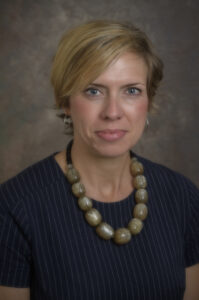Challenger: Matt Clifford
You can also read Amy’s responses to the ACLU survey here.
Why are you the best candidate for School Board?
I am a mom of two Delaware public school educated children and a professional educator. I’ve worked in Delaware schools for about 10 years. As a teacher educator, I have worked with and for aspiring and experienced teachers in most of the districts in the state and some charter schools. I have a deep understanding of the strengths and challenges faced by public schools. Now, I work as a full time education researcher.

How will you prioritize improvement to student academic achievement, particulary reading and math?
Overall, student achievement in math and reading across the state has been in decline since 2013, as indicated by National Assessment for Educational Progress (NAEP) scores. This decline can be explain partly by reduction in revenues to districts as a result of the Great Recession in 2007-2009. It’s clear that education funding in the state needs reform. We need the state’s electorate to rally behind fairer, more transparent, and adequate funding that is flexible enough for districts to use in ways that support students who are not performing on grade level.
What steps will you pursue to strengthen the connection between parents and the school system?
As a board member, I will work with the superintendent and other board members to create an environment of trust through clear and timely communications; work to engage families directly in activities that allow them to participate in their children’s learning; and collaborate with the district’s educators and families to use data to make informed decisions and strengthen effective practices.
How will you ensure that parents will be made aware of proposed or new regulations or policies that affect their children?
To make parents and guardians aware of new policies that will affect their children, I will collaborate with district administrators and fellow school board members to construct clear, timely, and accessible communications through a variety of channels: district’s website, social media, school newsletters, etc.
What steps should be taken at schools to create a safer learning environment?
Continuing the initiatives that started after COVID-19 for social and emotional learning (SEL) in tandem with core subjects are crucial for supporting students in learning how to regulate their emotions and how to communicate with peers and adults. I’ve observed firsthand how SEL programs help students learn about themselves, and its association with reductions in bullying and discrimination. Many of our schools already use Positive Behavioral Interventions and Supports (PBIS) and/or restorative practices to help students develop positive behaviors and improve outcomes in all areas. Reinforcing their use can help make schools safe and caring places.
What changes should be made, if any, to local and state funding to maximize the amount that goes directly to producing academic achievement?
The report was published by the Delaware Department of Education was published in December 2019. I was part of the study team who conducted the assessment and wrote the findings and recommendations. I would encourage our local electorate to read the report, which contains actionable recommendations for improving the fairness, adequacy, transparency, and flexibility to the state’s public school funding system.
How will you commit to increasing classroom transparency - including but not limited to curriculum - with parents?
As a parent of two students who attended Delaware public schools, I found that communication from teachers was rarely a problem. I also found teachers to be incredibly responsive to emails or phone calls I made to them. I’m a strong advocate for parents and guardians to connect directly to their children’s teachers when needed to give kudos for their hard work or ask questions when something is unclear. My experience has been that every teacher has provided a syllabus with learning outcomes, expectations, major assignments, and grading scheme. Also, logging into Schoology to see what’s going on in class.
How will providing curricula that defines people as oppressors and oppressed based on group identity such as race or sex either help or hinder students in their interactions with the world around them?
This is a loaded question intended to rile up parents who might not completely understand curriculum adoption or high quality instructional materials. Shielding students from certain topics or viewpoints out of fear of controversy or disagreement only serves to promote ignorance. Education is about confronting challenging ideas, encouraging debate, and empowering students to think critically about the world. Exposing students to a variety of viewpoints, even those that may be controversial or challenging, is essential for cultivating active participation in a democratic society. Every student has the right to curricula that reflect the diversity of our society and fosters inclusivity.
In what circumstances would it be considered acceptable for material that contains visual or written depictions of sexual acts to be presented to students in the classroom or in school libraries?
This is also a loaded question. If I answer one way, I’ll be accused of believing pornography is acceptable in schools. If I answer the opposite way, then I will be accused of censoring free speech, which is a fundamental part of our nation’s constitution. I trust that our public school educators and librarians, who are highly educated and have a deep understanding of the development needs of youth, have the ability to make reasoned decision about texts available in schools. I also advocate for parents to be informed and to collaborate with teachers as needed.
